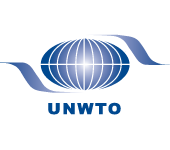World Tourism Organization (UNWTO)

The World Tourism Organization (UNWTO) is a specialized agency of the United Nations, and the leading international organization in the field of tourism. It serves as a global forum for tourism policy issues and a practical source of tourism know-how. UNWTO’s mission is to promote and develop tourism as a significant means of fostering international peace and understanding, economic development and international trade.
UNWTO plays a central and decisive role in promoting the development of responsible, sustainable and universally accessible tourism, paying particular attention to the interests of developing countries. Its membership includes 155 Member States and 7 territories and around 400 affiliate members representing the private sector, educational institutions, tourism associations and local tourism authorities.
Direct actions that strengthen and support the efforts of national tourism administrations are carried out by UNWTO’s Regional Representations (Africa, the Americas, East Asia and the Pacific, Europe, the Middle East and South Asia) based at the Headquarters in Madrid.
UNWTO is committed to the United Nations Millennium Development Goals (MDGs), geared toward reducing poverty and fostering sustainable development.
Selected TCB programmes and initiatives in this guide
ST-EP Initiative
Global Sustainable Tourism Council (GSTC) and criteria
ETC/UNWTO Handbook on E-Marketing for Tourism Destinations
Statistics and Tourism Satellite Account
UNWTO World Tourism Barometer
UNWTO Tourism Towards 2030
The TSA
Hotel Energy Solutions (HES)[1] a UNWTO-initiated project made possible by the support of Intelligent Energy Europe, and implemented in close partnership with UNEP, IH&RA, EREC and ADEME has a goal to increase energy efficiency by 20% and the use of renewable energies by 10% in small and medium enterprise (SME) accommodations across the EU, demonstrating that economic growth and the environment can and should go hand in hand. The HES toolkit, available online and free of charge, is currently used as well as adapted in number of destinations worldwide.
• UNIDO is the lead partner in the joint COAST (Collaborative Actions for Sustainable Tourism) Project[2] in which UNWTO is collaborating. The Project is a Global Environment Facility (GEF) funded project on Coastal Tourism in 9 countries in Sub-Saharan Africa: Cameroon, Gambia, Ghana, Kenya, Mozambique, Nigeria, Senegal, Seychelles and Tanzania. The project’s main objective is to demonstrate best practices and strategies for sustainable tourism development so as to reduce the degradation of marine and coastal environments of trans-boundary significance. Within the framework of the project, UNWTO is responsible for the components on “eco-tourism development in coastal areas”, and “sustainable tourism governance and management”.
[1] HES: http://hotelenergysolutions.net/
[2] COAST Project: http://www.unido.org/index.php?id=1002064 and http://coast.iwlearn.org/
UNWTO projects are implemented through funding obtained from a variety of major donor agencies, such as the European Commission, UNDP, the World Bank, the ADB, several bilateral donors and others. UNWTO has observer status with the WTO on issues regarding trade in tourism services. Additional advocacy and promotion of tourism as a trade in service is coordinated through the joint UN inter-agency initiative of the Steering Committee on Tourism for Development.
United Nations Steering Committee on Tourism for Development (SCTD)[2]: In 2010, the World Tourism Organization (UNWTO) launched an initiative for a more cohesive approach to tourism development at the international level and as well to ‘Delivering as One’ to ensure a more effective development assistance and to accelerate progress towards the MDGs. Since then, the UNWTO-led initiative with eight other UN agencies and programmes (ILO, ITC, UNCTAD, UNDP, UNEP, UNESCO, UNIDO, WTO) have come together to coordinate their tourism-related work under the UN Steering Committee on Tourism for Development (SCTD). [more details below under “Inter-Agency Coordination Mechanisms”]
